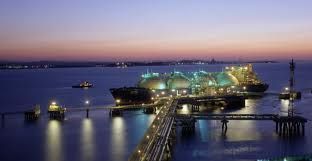
Asian liquefied natural gas (LNG) LNG-AS spot prices slipped below $13 per million British thermal units (mmBtu) for October deliveries this week as a third month of weak demand shielded the market from a string of supply losses.
The price of seaborne gas imports into Asia fell half a dollar to around $12.80/mmBtu compared with last week, according to traders surveyed by Reuters.
Rapid stockpiling at Japanese and South Korean import terminals earlier in the summer combined with mild weather and reduced demand for air-conditioning have dampened demand for the fuel.
"(South Korean utility) Kogas won't buy much above $12.50 at the moment. As soon as they see the Indians pick up a bargain they refuse to pay anything higher than the equivalent netback," an LNG trader said, putting the Asian price in the high $12/mmBtu range.
Indian buyers pay about $2/mmBtu less than South Korean utilities for LNG in part due to lower transportation costs. A netback mainly describes the cost of transporting a cargo between separate markets.
Other traders gave more bearish assessments of spot LNG prices in Asia. Two cited $12.50/mmBtu as the true market price, disputing more bullish estimates from producers of above $13.00/mmBtu.
The bearish view appeared to be borne out by the ongoing reluctance of top importers Japan and South Korea to buy additional cargoes.
In Japan buyers appear satisfied with short- to medium-term supply deals inked after the Fukushima nuclear disaster in March 2011 crippled the country's nuclear industry, traders said.
Even armed attacks on Yemen's sole export plant and unplanned maintenance in top LNG exporter Qatar that slashed output failed to revive demand.
Qatargas's 7.8 million tonne per year LNG production facility has been shut down because it needs a new motor, it said on Thursday.
An explosion caused by sabotage has crippled output from Yemen's only LNG exporting plant, in the process restricting supply to global markets.
Despite low prompt demand for cargoes, Japan's 10 utilities consumed a record amount of LNG in July, burning 5 percent more than during the same month last year.
The high LNG usage compensated for the loss of the majority of the country's nuclear power following the Fukushima crisis.
Japan, the world's largest consumer of the fuel, has for the most part bypassed the spot market and instead secured supplies through short-term and medium-term contracts to meet its LNG demand, but Japanese demand still pushed prices up to a high of around $18 per mmBtu in May ahead of the summer.
Asia is even turning away some cargoes amid pervasive oversupply in the region.
In the Atlantic market, Europe continued to receive more cargoes diverted by Qatar from saturated Asian markets, with the UK and Belgium seeing the greatest pick-up in deliveries.
A shipment bound for Malaysia was diverted towards the UK port of Milford Haven on Wednesday, with an expected arrival date of Sept. 14.
The cargo, which was loaded in Egypt's Idku export plant on Aug. 7-8, was crossing Africa's southernmost point when it changed course towards the UK, port data shows.
British wholesale gas prices firmed on Friday as summer maintenance programmes disrupted supplies from North Sea fields and from Norway, while packed storage tanks and seaborne gas shipments capped gains.
In the United States, U.S. natural gas futures edged lower early on Friday, pressured by long-term forecasts calling for mild autumn weather in consuming regions, which should curb any late-season cooling or early-season heating demand.
Source: Reuters
We use cookies to improve your experience. By continuing to use our site, you accept our Cookies, Privacy Policy,Terms and Conditions. Close X